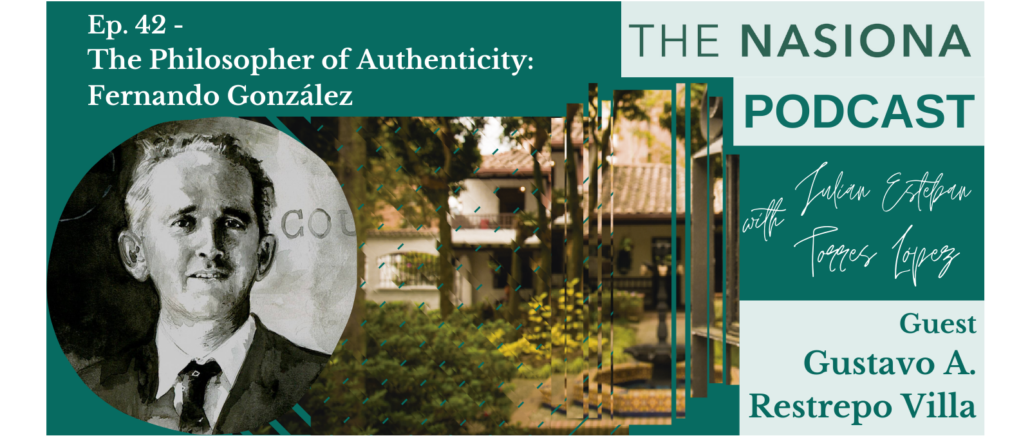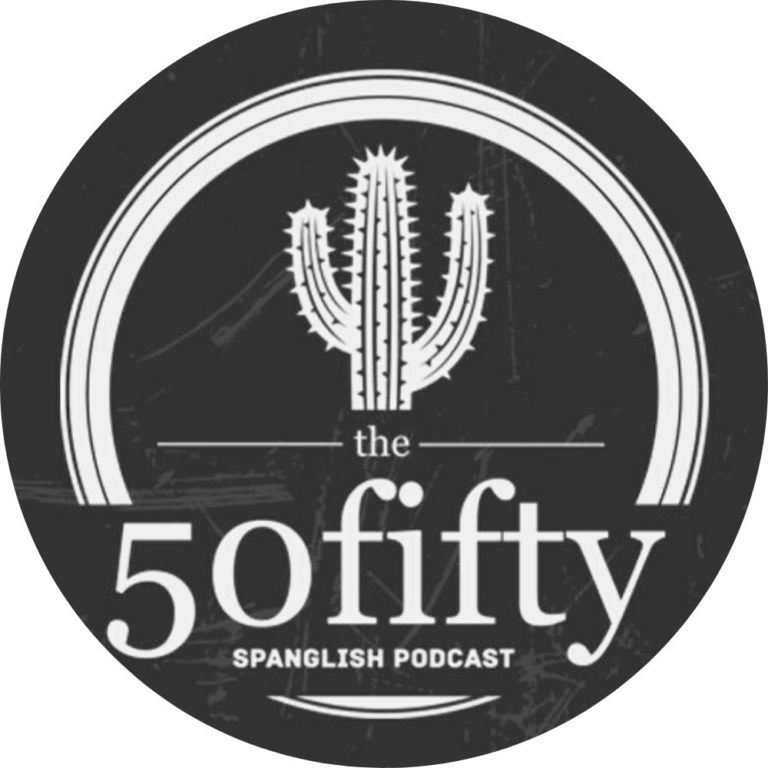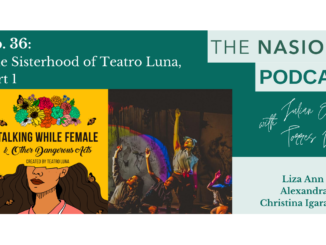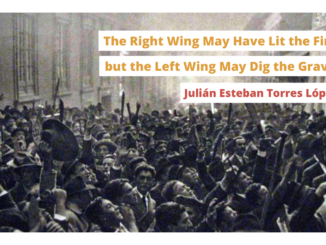
You can also find our podcast episodes on Apple Podcasts, Spotify, iHeartRadio, Stitcher, or wherever you get your podcasts.
The Spanish-to-English interview translation is by Olga Gonzalez Latapi / La traducción de la entrevista del español al inglés es de Olga Gonzalez Latapi.
Given the centering of Euro and Anglo authors, thinkers, artists, etc., and the deliberate attempt to conceal unpleasant and incriminating facts about history and other content taught K-12 and beyond, our education systems in the United States and Canada are still forms of forced colonial assimilation. Let’s call the dominant culture of traditional education in these countries what it is: Anglo- and Euro-centric propaganda; a continued violence on humanity, memory, and critical thinking itself; white supremacy performed and perpetuated.
It is in the spirit of decolonizing our education that we introduce to you a new project at The Nasiona, where we look to center, elevate, and amplify the voices, histories, and experiences of those artists, thinkers, and culture makers who have been kept out of the Anglo- and Euro-centric mainstream. To start the project, I’d like to introduce you to Fernando González, who has been regarded at one time or another as the philosopher of authenticity, the philosopher of somewhere else, the philosopher of South America.
Fernando González was a Colombian writer and existentialist philosopher who lived between 1895 and 1964. González is considered one of Colombia’s most original and controversial writers of the 20th century. His analyses influenced literary and cultural movements during his time, and have continued to do so well into the 21st century. And yet, he is unknown in the English-speaking world.
Over the years, after reading his work in Spanish, I was shocked, but not surprised, to learn there has never existed an honest effort to translate him into English. I thought this a disservice to intellectual and literary history. So, in the spirit of amplifying a powerful and revolutionary South American voice who is widely unknown outside of the Spanish-speaking world, The Nasiona has entered into a partnership with Corporación Otraparte, a nonprofit organization in Colombia dedicated to preserving and amplifying Fernando González’s work and home, which is now a museum, cafe, and cultural center.
To start this partnership with Corporación Otraparte, The Nasiona’s Spanish-to-English translator, Olga González Latapi, is currently in the process of translating Fernando González’s first work, Pensamientos de un viejo (Reflections of an Old Man), originally published in 1916. To further advance the mission, I interviewed Corporación Otraparte’s executive director, Gustavo A. Restrepo Villa, for this podcast episode. I conducted the interview via email correspondence in Spanish between 2019 and 2020. Olga González Latapi translated the interview into English from Spanish, and Don Jesse of The-50FIFTY did the voiceover work to bring Gustavo A. Restrepo Villa’s responses to life in English. You can read the transcript of the interview in both English and Spanish below.
And now, here’s the interview with Gustavo A. Restrepo Villa on Fernando González: philosopher of authenticity, philosopher of South America, and philosopher of somewhere else … of Otraparte.
Dada la centralidad de autores, pensadores, artistas, etc., europeos e angloparlantes, y el intento deliberado de esconder los hechos incriminatorios y desagradables de la historia, así como otro contenido ahora enseñado desde el jardín de niños hasta preparatoria y mas allá, el sistema educativo en Estados Unidos y Canadá todavía es un tipo de asimilación colonial. Llamemos la dominación de la cultura y tradición educativa en estos países lo que realmente es: propaganda Anglo y Eurocéntrica; en si misma una continua violencia sobre la humanidad, memoria y pensamiento critico; la supremacía blanca realizada y perpetuada.
Es en el espíritu de descolonización dentro de nuestra educación, ahora introducimos un nuevo Proyecto en The Nasiona — espacio donde buscamos centrar, elevar y amplificar las voces, historias y experiencias de estos/as artistas, pensadores/as y creadores/as de la cultura, personas que han sido relegadas fuera de la convención Anglo- y Eurocéntrica. Para comenzar este Proyecto, me gustaría introducir a Fernando González, quien ha sido considerado, una vez u otra, el filósofo de autenticidad, el filósofo de otra parte, el filósofo de Sudamérica.
Fernando González fue un escritor y filósofo existencialista colombiano quien vivió entre 1895 y 1964. González es considerado uno de los escritores colombianos más originales y polémicos del siglo veinte. Sus análisis influenciaron los movimientos literarios y culturales durante su época, y ha continuado a hacerlo hasta bien dentro del siglo 21. Y, aun así, es prácticamente desconocido en el mundo de habla inglesa.
A través de los años, y después de leer su trabajo en español, me sentí estupefacto, pero no sorprendido, al aprender que nunca se ha ejercido un esfuerzo en traducir su trabajo al inglés. Considero esto un daño a nuestra historia intelectual y literaria. Así que, dentro del espíritu de amplificar una voz poderosa y revolucionariamente Sudamericana — una que es grandemente desconocida fuera del mundo de lengua española — The Nasiona ha comenzado una asociación con la Corporación Otraparte, una organización no lucrativa dentro de Colombia dedicada a preservar y amplificar el trabajo y hogar de Fernando González, espacio que ahora es museo, café y centro cultural.
Para comenzar este nuevo capitulo con la Corporación Otraparte, Olga González Latapi, traductora español-ingles dentro The Nasiona, esta en el proceso de traducir el primer trabajo de Fernando González: Pensamientos de un Viejo (Reflections of an Old Man), originalmente publicado en 1916. Para continuar avanzando esta misión, realicé, dentro de este episodio, una entrevista con el director ejecutivo de la Corporación Otraparte: Gustavo A. Restrepo Villa. Entre 2019 y 2020 realicé esta entrevista en español, y a través de correo electrónico. Olga González Latapi tradujo dicha entrevista de español al inglés, y Don Jesse de The 50FIFTY realizó el trabajo de narración para traer las respuestas de Gustavo A. Restrepo Villa a la vida en la lengua inglesa. Puedes leer la transcripción de la entrevista, ambas en ingles y español, dentro de nuestro sitio web.
Y ahora, aquí está la entrevista con Gustavo A. Restrepo Villa acerca de Fernando González: filósofo de autenticidad, filósofo de Sudamérica y filósofo de otra-parte … de Otraparte.
Who is Fernando González? / ¿Quién es Fernando González?
I give way to the Nicaraguan poet Ernesto Cardenal:
“Who is Fernando González? He is a writer who does not fit only one category: mystic, novelist, philosopher, poet, essayist, humorist, theologist, anarchist, foul-mouthed, blessed and all at once irreverent, sensual and chaste…What else? A hyper-original writer like none other in Latin America. Or anywhere else, as far as I know.”
Taking this into account, he is, to me, a writer of the future.
Le cedo la palabra al poeta nicaragüense Ernesto Cardenal:
«¿Quién es Fernando González? Es un escritor inclasificable: místico, novelista, filósofo, poeta, ensayista, humorista, teólogo, anarquista, malhablado, beato y a la vez irreverente, sensual y casto… ¿Qué más? Un escritor originalísimo, como no hay otro en América Latina ni en ninguna otra parte que yo sepa».
Teniendo en cuenta lo anterior, para mí es un escritor del futuro.
https://www.otraparte.org/fernando-gonzalez/vida/cardenal-ernesto-1/
What is Otraparte? / ¿Qué es Otraparte?
Otraparte is, before all else, the house of writer Fernando González and his wife Margarita Restrepo. It was built in 1940 for them both and their five children: Alvaro, Ramiro, Pilar, Fernando and Simon. These days, on initiative of the children, the house is a museum and cultural center. Surrounded by the Coffeeshop, Library and Theatre – spaces that shape the Cultural and Environmental Park Otraparte – the house stands in an area of approximately four thousand, two hundred square meters. It has been declared, by law 1068 of 2006, Asset of Public and Cultural Interest of the Nation.
Otraparte es ante todo la casa del escritor Fernando González y su esposa Margarita Restrepo, construida en 1940 para ellos y sus cinco hijos Álvaro, Ramiro, Pilar, Fernando y Simón. Actualmente, por iniciativa de sus hijos, la casa es museo y centro cultural y está rodeada de Café, Biblioteca y Teatro, espacios que conforman el Parque Cultural y Ambiental Otraparte en un área de aproximadamente cuatro mil doscientos metros cuadrados. Fue declarada Bien de Interés Público y Cultural de la Nación mediante la ley 1068 de 2006.
https://www.otraparte.org/corporacion/boletin/20060809-bol-47/
What is your relationship to Otraparte? / ¿Cuál es tu relación con Otraparte?
On June 12, 1991, I paid my first visit to the Otraparte House Museum. I had just turned twenty. I went to Otraparte after reading Retrato vivo de Fernando González ( “Living Portrait of Fernando González”), a book by Felix Angel Vallejo. I created the website “Otraparte.org” in 1999 as my own homage to Fernando González and in 2001 I was called to participate in the creation of the Fernando González Corporation – Otraparte, a non-profit of which I am now director. I am, thus, citizen of Otraparte; and have been for twenty-nine years.
El 12 de junio de 1991 visité por primera vez la Casa Museo Otraparte. Acababa de cumplir 20 años y lo hice tras la lectura del libro Retrato vivo de Fernando González de Félix Ángel Vallejo. En 1999 creé la página web Otraparte.org como homenaje personal a Fernando González, y en 2001 fui llamado a participar en la creación de la Corporación Fernando González – Otraparte, entidad sin ánimo de lucro de la que soy director. Soy, pues, «habitante» de Otraparte desde hace 29 años.
Can you tell us a little bit about the sociopolitical environment González grew up in and also wrote about? / ¿Puedes contarnos un poco sobre el entorno sociopolítico en el que creció y sobre el que escribió?
Fernando González was born at the end of the 19th century. Therefore, he grew up during the Colombian historical era known as the Conservative Hegemony Era which ended in 1930 with the election of liberal president Enrique Olaya Herrera. Fernando González’s reaction to this extremely conservative environment was Viaje a pie ( “Journey on Foot” 1929), a book at the end of which he dedicates a few words to his wife: « You, Margarita, who knows the intense love this author has for the Colombian land, for the Colombian air, for the lonely Simón Bolivar from Santa Marta and for the territorial sea. You alone can understand the final goal of this book: to describe to young people the conservative Colombia of Rafael Núñez; to do something so that the man who was thrown forward, the one who will scourge the merchants, comes clear into view. This book is for you; you know what this author thinks of our Lord Jesus Christ». Despite the last comment on Jesus Christ, the book was banned under mortal sin by the Bishops from Medellín and Manizales. Years later, World War II breaks out and then, just like all Colombians, he endures the upsurge of partisan violence in the country following the assassination of Jorge Eliécer Gaitán. González dies in 1964, the year in which the Revolutionary Armed Forces of Colombia (People’s Army) emerges. Same year in which The Beatles arrive in the United States.
Fernando González nació a finales del siglo xix, y por lo tanto creció durante el período histórico colombiano conocido como la Hegemonía Conservadora, que terminó en 1930 con la elección del presidente liberal Enrique Olaya Herrera. La respuesta de Fernando González a este ambiente extremadamente conservador es su libro Viaje a pie (1929), en el que al final le dedica estas palabras a su esposa: «Tú, Margarita, que sabes el intenso amor del autor por su tierra colombiana, por el aire colombiano, por el Simón Bolívar solitario de Santa Marta, por el mar territorial, eres la única que puede entender la finalidad de este libro: describirle a la juventud la Colombia conservadora de Rafael Núñez; hacer algo para que aparezca el hombre echado para adelante que azotará a los mercaderes. Para ti es este libro; tú sabes qué piensa el autor de Nuestro Señor Jesucristo». A pesar del comentario final sobre Jesucristo, la lectura del libro fue prohibida bajo pecado mortal por los obispos de Medellín y Manizales. Años más tarde estalla la Segunda Guerra Mundial y luego, al igual que todos los colombianos, padeció el recrudecimiento de la violencia partidista en el país tras el asesinato de Jorge Eliécer Gaitán. Murió en 1964, el año en el que surgen las FARC y llegan Los Beatles a Estados Unidos.
https://www.otraparte.org/fernando-gonzalez/imagen/facsimiles/prohibicion-de-viaje-a-pie/
Why does Fernando González deserve to be remembered? / ¿Por qué Fernando González merece ser recordado?
Because his work is of great literary quality. It is also absolutely current. It makes you think and it makes you laugh. His books do not taste of the past but of the flight of tomorrow. The first, Pensamientos de un viejo ( “Thoughts of an Old Man” 1916), is dedicated to the birth of a «distant reader», and in the end «to time and all distant readers». That is to say, from his youth he had the conviction to write for the future and the enthusiasm with which many generations have read his work proves it. In 1911, at barely sixteen, he expressed the following in an opinion column: «It so happens that when a thinker or an artist rises too much, he or she is not understood but by a few exceptional and privileged intelligences. Ones that more or less reach the intelligence of the thinker or artist. These people were born in earlier times to the one that corresponded to them. They lived in a medium that was not their own, and they fought until they died in isolation». A fate that was fulfilled by his own life. His work helps us understand the Colombia of actuality, but furthermore it poses several philosophical questions. Worthwhile questions for all time and for every human being.
Porque su obra es de una gran calidad literaria y porque además es absolutamente vigente. Te pone a pensar y a reír. Sus libros no tienen sabor a pasado sino vuelo de futuro. El primero, Pensamientos de un viejo (1916), está dedicado al comienzo a «una lectora lejana», y al final «al tiempo y a los lectores lejanos». Es decir, desde muy joven tenía la convicción de estar escribiendo para el futuro y el entusiasmo con que lo han leído varias generaciones así lo demuestra. En 1911, con apenas dieciséis años, expresó lo siguiente en una columna de opinión: «Sucede que cuando un pensador o artista se eleva demasiado, no es comprendido más que por algunas inteligencias excepcionales y privilegiadas que alcanzan más o menos la inteligencia del pensador o artista. Estos hombres nacieron en época anterior a la que les correspondía y vivieron en un medio que no era el suyo, y lucharon hasta morir en el aislamiento». Lo cual se cumplió a cabalidad en su propia vida. Su obra ayuda a comprender a la Colombia actual, pero además plantea numerosas cuestiones filosóficas válidas para todo tiempo y para todo ser humano.
https://www.otraparte.org/corporacion/boletin/20111222-bol-105/
What is Fernando González best known for? / ¿Por qué es mejor conocido Fernando González?
For his rebel spirit, the excellence of his literary style, his originality, sense of humor, mysticism, irony and depth of ideas. In the words of the poet José Manuel Arango, González is known because he «thought on us using the dialect we use to speak». And in the words of writer William Ospina: «Reading him [González] is not, I think, a mere intellectual experience. It is a vital experience. Like listening to the wind in the trees, like diving into the sea, like studying the roses or muscles, like learning to swim or to fly a kite. I am sure that few guides can help us find the backbone of our own dream as much as this dreamer so strongly Colombian, so strongly Antioquian; and at the same time so much from elsewhere. From the Galaxy not found in myths, from the world not in the cards, from the country not in any map. From the mysterious, diurnal, sacred, disconcerting, moving country of the once and the never again».
Por su espíritu rebelde, la excelencia de su estilo literario, su originalidad, el humor, el misticismo, la ironía, la profundidad de su pensamiento. En palabras del poeta José Manuel Arango, porque «usó para pensarnos el dialecto que hablamos». Y en las del escritor William Ospina: «Leerlo no es, creo yo, una mera experiencia intelectual, es una experiencia vital, como oír el viento en los árboles, como meterse al mar, como estudiar las rosas o los músculos, como aprender a nadar o a volar en cometa. Estoy seguro de que pocos guías pueden ayudarnos tanto a encontrar la madera de nuestro propio sueño como este soñador tan reciamente colombiano, tan reciamente antioqueño y a la vez tan de otra parte. De la galaxia que no está en los mitos, del mundo que no está en las cartas, del país que no está en los mapas. Del misterioso, cotidiano, sagrado, desconcertante, conmovedor país de una vez y de nunca más».
https://www.otraparte.org/fernando-gonzalez/vida/ospina-william-2/
In what way was Fernando González controversial? / ¿Cómo fue controversial Fernando González?
In his childhood, he was expelled from school for yelling «sisters piece of shit» at his professors. He was then expelled from the San Ignacio school for denying the «first philosophical principle», an act that equaled the denial of God. González’s first book, Pensamientos de un viejo ( “Thoughts of an Old Man” 1916), was not to the liking of the church, who furthermore forbid, under mortal sin, the reading of El derecho a no obedecer (“The right not to obey” 1919), his degree thesis. They also forbade Viaje a pie ( “Journey on foot” 1929). González was exiled from Italy by Mussolini, exiled from France by president Eduardo Santos; and his book, Mi Compadre ( “My Friend” 1934) was disowned in Venezuela and in Colombia. He was branded pornographic because of El remordimiento ( “The remorse” 1935) and was removed from his position at the Municipality of Medellín for reporting a theft. These facts barely show a shade of the controversy that breathes in his work and that manifested throughout his life. A life that Ernesto Ochoa Moreno describes as a voyage «from rebellion to ecstasy».
En la niñez fue expulsado de la escuela por gritarles «hermanas cagonas» a sus profesoras. Fue expulsado del colegio San Ignacio por negar el «primer principio filosófico», que equivalía a negar a Dios. Su primer libro, Pensamientos de un viejo (1916), no fue del agrado de la Iglesia, que además prohibió bajo pecado mortal la lectura de su tesis de grado El derecho a no obedecer (1919) y Viaje a pie (1929). Fue duramente atacado por sus críticas al general Santander y su elogio de Bolívar. Fue expulsado de Italia por Mussolini, fue expulsado de Francia por el presidente Eduardo Santos, y su libro Mi Compadre (1934) fue repudiado en Venezuela y en Colombia. Fue tildado de pornográfico por El remordimiento (1935) y fue destituido de su cargo en el Municipio de Medellín por denunciar un robo. Estos hechos señalan apenas superficialmente el tono de controversia que se respira en su obra y que se manifestó a lo largo de su vida, la cual el periodista Ernesto Ochoa Moreno describe como un viaje «de la rebeldía al éxtasis».
https://www.otraparte.org/wp-content/uploads/folleto-de-la-rebeldia-al-extasis.pdf
https://artsandculture.google.com/exhibit/de-la-rebeld%C3%ADa-al-%C3%A9xtasis/awKyfKpm5oZYIA
Are his ideas just as controversial nowadays? / ¿Son sus ideas todavía polémicas hoy?
Yes, because he is an author who puzzles his readers. Without ceasing to be consistent, he wrote Nociones de izquierdismo ( “Notions of leftism” 1936) and the Christmas novena El pesebre ( “The manger” 1963). For he was an anarchist who prayed the Rosary: «If freedom and anarchy are the end of life, government and school, we must consider all culture as a medium to achieve that. To achieve the self-expression of each citizen every day more and more clearly». It is also difficult to label him politically: «It can be predicted, from childhood, who will be liberal or conservative. It all depends on whether each walks in a vain or hypocritical way».
Sí, además porque es un autor que desconcierta a sus lectores, pues sin dejar de ser consecuente escribió Nociones de izquierdismo (1936) y la novena de Navidad El pesebre (1963). Era, pues, un anarquista que rezaba el rosario: «Si la libertad y la anarquía son el fin de la vida, el gobierno y las escuelas, toda la cultura la consideraremos como medio para conseguir eso. Conseguir que cada ciudadano se auto-exprese cada vez más netamente». También es difícil encasillarlo políticamente: «Desde la infancia puede pronosticarse quién será liberal o conservador, según camine vanidosa o hipócritamente».
What is Nadaism (“Nothing-ism”) and how did Fernando González influence this movement? / ¿Qué es el nadaísmo y cómo influyó Fernando González a este movimiento?
«Nadaism, as a limited concept, is a revolution in the form and content of the prevailing spiritual order in Colombia. For the youth, it is a schizophrenic-conscious state against the passivity of spirit and culture». This is how Gonzalo Arango described it in his first manifesto in 1958. It was around the same time that he relished the work of Fernando González, who he met in Envigado:
«Around the time I read his books, I convinced myself that such a great man – of which nothing was known – had to be dead. But he lived only a fifty-cent bus ticket away from Medellin, in a little house at the edge of the Envigado highway, in between shady acacia trees and dwarfish orange trees: “Otraparte”».
Gonzalo then became a diffuser of the work of González and the latter became enlivened with the nadaists and supported them through his friendship, conversation and even through a few admiring remarks he wrote about them. In one of them, within Libro de los viajes o de las presencias ( “Book of travels or presences”), he says: «Come [Jesus] where Gonzalo is!, for a while he has been working hard to meet you face to face, and he is perched in his nakedness, yelling: “No more! This is my last chance!”».
«El Nadaísmo, en un concepto muy limitado, es una revolución en la forma y en el contenido del orden espiritual imperante en Colombia. Para la juventud es un estado esquizofrénico-consciente contra los estados pasivos del espíritu y la cultura». Así lo describió Gonzalo Arango en 1958, en su primer manifiesto, y por la misma época se entusiasmó con la obra de Fernando González, a quien fue a conocer a Envigado:
«En la época que leí sus libros me hice a la idea de que un hombre tan grande —del que nada se sabía— tenía que estar muerto. Sin embargo, vivía a 50 centavos de bus de Medellín, en una casita a la orilla de la carretera de Envigado, entre pisquines umbríos y naranjos enanos: “Otraparte”».
Gonzalo se convirtió entonces en un difusor de la obra de González, y a su vez éste se entusiasmó con los nadaístas y los apoyó mediante su amistad y conversación, también por medio de algunas notas elogiosas que escribió sobre ellos. En una de ellas, en el Libro de los viajes o de las presencias, dice: «¡Ven [Jesús] donde Gonzalo!, que hace tiempo está haciendo diligencias para conocerte de vista, y está encaramado en su desnudez, gritando: “¡Nada! ¡Esta es mi última oportunidad!”».
What did González write about? / ¿Sobre qué escribió González?
The subjects in his work are wide-ranging: philosophy, literature, history, anthropology, sociology, art, religion. But I give the floor to Félix Ángel Vallejo: «Life, death, God…man, Earth and the cosmos…, all this gains, on his lips, a meaning that is alive and deep…, that astounds….That is why, when hearing him speak…the first thing I discovered is that until that moment I had been blind to mystery…; and all of a sudden…, when on a road…as an exile…, I found myself in the presence of a sorcerer who showed it to me…».
Son variadísimos los temas en la obra de Fernando González: filosofía, literatura, historia, antropología, sociología, arte, religión, pero le cedo la palabra a Félix Ángel Vallejo: «La vida, la muerte, Dios…, el hombre, la tierra, el cosmos…, todo esto adquiere, en sus labios, un sentido tan vivo y hondo…, que asombra… Por eso, al oírlo hablar… lo primero que descubrí fue que yo había permanecido muerto ante el misterio…; y que de pronto…, cuando iba por un camino…, como desterrado…, me encontré con un brujo que me lo mostró…».
What distinguishes Fernando González from other intellectuals and writers of his time? / ¿Qué diferencia a Fernando González de otros intelectuales y escritores de su tiempo?
In a letter dated November 22, 1930, Fernando González tells writer Antonio José «Ñito» Restrepo: «We cannot agree: you are an illustrious coplero (“balladist), […] and I am a metaphysician. You are my opposite». In Cartas a Estanislao ( “Letters to Stanislaus”) he manifests further against the «literature of words» and the «verbal and sentimental overindulgence». According to priest Alberto Restrepo González, from Fernando González’s first book, the author «intentionally avoids juggling adjectives and boasts of erudition. Those things so characteristic of the centenarian era».
En carta del 22 de noviembre de 1930, Fernando González le dice al escritor Antonio José «Ñito» Restrepo: «No podemos entendernos: usted es un ilustre coplero, […] y yo soy un metafísico. Usted es mi antípoda». En Cartas a Estanislao se manifiesta además en contra de la «literatura de palabras» y de la «intemperancia verbal y sentimental». Según el sacerdote Alberto Restrepo González, desde su primer libro Fernando González «elude intencionalmente los malabares adjetivos y los alardes de erudición, tan propios de la época centenarista».
What works do you recommend people read to introduce themselves to his philosophy? / ¿Qué trabajos recomienda que la gente lea para obtener una introducción a su filosofía?
«Itinerario de un viandante» (“Itinerary of a pedestrian”) by Juan Sebastián López Morales:
https://www.otraparte.org/fernando-gonzalez/vida/lopez-juan-s-1/
«Fernando González, filósofo» (“Fernando González, philosopher”) by María-Dolores Jaramillo:
https://www.otraparte.org/fernando-gonzalez/vida/jaramillo-maria-dolores-2/
«Introducción a la Revista Antioquia» (“Introduction to the magazine Revista Antioquia”) by Alberto Aguirre:
https://www.otraparte.org/fernando-gonzalez/vida/aguirre-alberto-7/
«Fernando González, ¿filósofo colombiano?» ( “Fernando González, Colombian philosopher?”) by Germán Marquínez Argote:
https://www.otraparte.org/fernando-gonzalez/vida/marquinez-german/
«Acercamientos a Fernando González» (“Approaches to Fernando González”) by Ernesto Ochoa Moreno:
https://www.otraparte.org/fernando-gonzalez/vida/ochoa-ernesto-1/
«Fernando González, testigo de la madurez de la fe» (“Fernando González, witness to the maturity of the faith”) by Alberto Restrepo González:
https://www.otraparte.org/fernando-gonzalez/vida/restrepo-alberto-6/
And many more from the “Vida” (Life) section within Otraparte.org:
Why is he considered the philosopher from elsewhere and the philosopher of authenticity? / ¿Por qué se le considera el filósofo de otra parte y el filósofo de la autenticidad?
Philosopher of «Otraparte» (elsewhere) because that is the name he gave his house in 1959. According to Javier Henao Hidrón, his biographer: «for that reason he had an iron fence installed on the porch. Construction of which he commissioned to nephew Javier Restrepo González (the character of “don Florín” in La Tragicomedia – “The Tragicomedy”). The inscription on the top of the fence, in beautiful bronze letters, bestows a deep meaning to the change in the name of the house from “La Huerta del Alemán” (The German’s Orchard). All of which has an enigmatic air, but refers back to himself, to his conviction on the dangers of the self: Cave canem seu domus dominum, which means: “Watch out for the dog, that is, with the owner of the house”». In terms of being the philosopher of authenticity, the same biographer calls him that «because the compendium of his work contains an admirable message of authenticity». This is how Fernando González explains it in Los negroides ( “The Negroids” 1936): «Because we are children of parents humiliated through Europe, we simulate Europe-ism, we exaggerate the European. Our personality is long-standing. This is why South America is not worth anything; but the day in which my methods of culture are in practice, the day we are naturally unabashed, we will have originality. I firmly believe that I am the philosopher of South America; I believe in the mission; I am compelled to be harsh and I will be hated, but would I be able to fulfill my duty with sweet words?».
Filósofo de «Otraparte» porque ese fue el nombre que le dio a su casa en 1959. Según narra su biógrafo Javier Henao Hidrón, «con tal motivo hizo colocar en el pórtico una verja de hierro, cuya elaboración encargó a su sobrino Javier Restrepo González (el personaje “don Florín” de La Tragicomedia). La inscripción que la misma lleva en su parte superior, en hermosas letras de bronce, confiere al cambio de nombre de La Huerta del Alemán un profundo significado, aparentemente enigmático, pero que se refiere a sí mismo, a su convicción acerca de los peligros del yo: Cave canem seu domus dominum, que quiere decir: “Cuidado con el perro, o sea, con el dueño de la casa”». De otro lado, el mismo autor lo llama el filósofo de la autenticidad «porque el conjunto de su obra contiene un admirable mensaje de autenticidad». Y así lo explica Fernando González en Los negroides (1936): «Porque somos hijos de padres humillados por Europa, simulamos europeísmo, exageramos lo europeo. Nuestra personalidad es vana. Por eso Suramérica no vale nada; pero el día en que se practiquen mis métodos de cultura, el día en que seamos naturalmente desvergonzados, tendremos originalidad. Creo firmemente que yo soy el filósofo de Suramérica; creo en la misión; me veo obligado a ser áspero y seré odiado, pero ¿podría cumplir mi deber con dulces vocablos?».
What was the Latin American vanity that he criticized? / ¿Cuál fue la vanidad latinoamericana que criticó?
The colonial complex, the desire to want to be «others», of not assuming our mixed-race condition and developing our own personality as the new culture on Earth. The feeling of shame for our indigenous and African ancestors. This is how he explains it in Los negroides ( “The negroids” 1936): «I do not write for the South Americans who have a rule imposed by the Spanish friars; I do not write for the Bogotans (and Bogotans are in Quito, Lima, Santiago and Buenos Aires), who have given birth to nothing, who pray as in Europe, who legislate as in Europe and who piss as in Europe».
El complejo colonial, el deseo de querer ser «otros», de no asumir nuestra condición mestiza y desarrollar nuestra propia personalidad como nueva cultura sobre la Tierra. El sentimiento de vergüenza por nuestros ancestros indígenas y africanos. Así lo explica en Los negroides (1936): «No escribo para los suramericanos que tienen un metro que les impusieron los frailes españoles; no escribo para los bogotanos (y bogotanos son en Quito, Lima, Santiago y Buenos Aires), que nada han parido, que rezan como en Europa, legislan como en Europa y que orinan como en Europa».
https://www.otraparte.org/fernando-gonzalez/obra/ediciones/los-negroides/
What did it mean for Fernando González to live an authentic life? / ¿Qué significó para Fernando González vivir una vida auténtica?
His lifelong dedication to self-knowledge and knowledge of his surroundings, «starting off of me and my Envigado», in a permanent struggle against lying and vanity, and being completely honest in his writing. This is how he described it in a notebook dated 1961: «I am afraid of drifting away from Being. I have this crazy desire to be true, crystal clear, to expose my comprehended existence at every instance. Give me your Holy Grace, Lord! Give me your grace!».
La dedicación de toda su vida al conocimiento de sí mismo y de su entorno, «partiendo de mí y de mi Envigado», en lucha permanente contra la mentira y la vanidad, siendo absolutamente honesto en sus escritos. Así lo describió en una libreta de 1961: «Tengo miedo de alejarme del Ser. Tengo loco deseo de ser verídico, clarísimo, exponer entendida mi existencia a cada instante. ¡Dame tu gracia, Señor! ¡Dame tu gracia!».
What was his relationship to politics? / ¿Cuál fue su relación con la política?
Beyond his performance as consul in four European cities, in the 1930s and 40s, he had an active participation in politics. He founded, with a fellow intellectuals and artists, the LAIN party – the National Left. Two books survive this time, both compilations of journalistic columns: Nociones de izquierdismo ( “Notions of Leftism” 1936) and Arengas políticas ( “Political harangues” 1945). He was named legal adviser at the Municipal Appraisal Office thanks to LAIN getting a seat in the Medellín Council. However, his candidacy to Congress was a disaster, according to his telling of it in Cartas a Estanislao ( “Letters to Stanislaus” 1935): «I earned two votes in Puerto Berrío, one in Amalfi and two in Yarumal. Fourteen more in Medellín from the candidates and relatives. None in Envigado and Itagûi, on those borders…; but even more serious: Don Benjamín wouldn’t vote…!». By Don Benjamín, he means his partner in Viaje a pie ( “Journey on foot” 1929). And he adds: «Failing to vote for me, Don Benjamín! What is philosophy, then?». Researcher Miguel Escobar Calle described Fernando González’s political phase in the following way: «From all this history the only thing that remains is this handful of harangues. All written by a philosopher turned “public man.” A man who, with passionate love, thought, poetry and sometimes in virulent ways, proposes political, educational, social and moral changes with a criteria of civic revelry. Read today they preserve – in a huge way – his present, because the record he makes of his country is not only current but it may appear pale in comparison to the reality we have been living in for several decades. As an ethical stance, as crying voice, as a dream of a better country, the Arengas (“Harangues”) were of little use. And that is why, precisely why, it is necessary to go back to them. Like a light that helps us walk in the dark».
Además de su desempeño como cónsul en cuatro ciudades europeas, en las décadas del treinta y del cuarenta participó activamente en política. Fundó, junto a otros amigos intelectuales y artistas, el partido LAIN – La Izquierda Nacional. De esa época quedan dos libros, compilaciones de columnas periodísticas: Nociones de izquierdismo (1936) y Arengas políticas (1945). Fue nombrado asesor legal en la Oficina de Valorización Municipal gracias a que LAIN obtiene un escaño en el Concejo de Medellín. Sin embargo, su candidatura al Congreso fue un desastre, según lo narra en Cartas a Estanislao (1935): «Obtuve dos votos en Puerto Berrío, uno en Amalfi y dos en Yarumal. Catorce en Medellín, que son de los candidatos y los familiares. Ninguno en Envigado y en Itagüí, en cuyos linderos…; pero más grave aún: ¡don Benjamín no quiso votar…!». Al mencionar a don Benjamín se refiere a su compañero de Viaje a pie (1929), y agrega: «¡No votar por mí, don Benjamín! Entonces, ¿qué es filosofía?». Y el investigador Miguel Escobar Calle describió así la faceta política de Fernando González: «De toda esa historia sólo queda, pues, este puñado de arengas, escritas por un filósofo convertido en “hombre público” que con amor apasionado, con pensamiento y poesía y a veces virulento, propone cambios políticos, educativos, sociales, morales, con criterios de rebeldía cívica. Leídas hoy conservan —en grandísima parte— su actualidad, pues la radiografía que hace de su país no sólo es vigente sino que puede parecer pálida ante la realidad que vivimos desde hace varias décadas. Las Arengas, como postura ética, como voz clamante, como ensueño de un país mejor, de poco sirvieron. Por eso, precisamente por eso, es necesario volver a ellas, como una luz que ayude a encaminar en la oscuridad».
https://www.otraparte.org/fernando-gonzalez/obra/ediciones/nociones-de-izquierdismo/
https://www.otraparte.org/fernando-gonzalez/obra/ediciones/arengas-politicas/
Why do you think his work has not been translated into English? / ¿Por qué crees que no ha sido traducido al inglés?
Some English translations exist, as well as two French translations of Viaje a pie (“Journey on Foot”), but in general Fernando González still continues to be unheard of by the international public. During the history of the Otraparte Company, many have expressed their interest in putting forward English translations, but none have succeeded. It is a pending task. Within the Google Arts & Culture portal, we have two exhibitions available in English for all visitors:
Sí existen algunas pocas traducciones al inglés, también dos al francés de Viaje a pie, pero en general Fernando González aún continúa inédito para el público internacional. Durante la historia de la Corporación Otraparte varias personas nos han manifestado su interés en adelantar traducciones al inglés, pero ninguna ha prosperado. Es una tarea pendiente. En el portal Google Arts & Culture tenemos dos exposiciones disponibles en inglés para los visitantes:
https://artsandculture.google.com/partner/otraparte
For other examples:
Otros ejemplos son:
https://www.otraparte.org/fernando-gonzalez/ideas/tr-en-1929-viaje/
https://www.otraparte.org/fernando-gonzalez/ideas/tr-en-1930-bolivar/
https://www.otraparte.org/wp-content/uploads/tr-en-1941-the-school-teacher.pdf
Why should Colombians read Fernando González? Why should Latin Americans? Why should non-Spanish speakers? / ¿Por qué deberían los colombianos leer a Fernando González?; ¿Por qué deberían los latinoamericanos leer a Fernando González?; ¿Por qué los no hispanohablantes deben leer a Fernando González?
Reading Fernando González is as interesting as reading any other great author in universal literature, the category to which he belongs. Fernando González is a writer of international stature. He is admired and praised widely by his contemporaries. «You have reinvented the novel», American playwright Thornton Wilder said in a letter, referring to El maestro de escuela ( “The school teacher” 1940). And the following was expressed by French writer Valéry Larbaud: «Just to be clear, I know Colombian literature in a very superficial way and have only a general view of Bolivarian countries; but in the end, his books are the first ones from those countries where I find solid and original thinking together with high quality prose. Solid and original thinking because, before all, it is human and it surpasses the borders of Ecuador, Colombia and Venezuela by far. Borders that are, on other matters, very widespread. You seem not to think on Europe; but there is something for Europe in what you write».
Leer a Fernando González es tan interesante como leer a cualquier otro gran autor de la literatura universal, que es la categoría a la que pertenece. F.G. es un escritor de talla internacional, admirado y elogiado ampliamente por sus contemporáneos. «Usted ha reinventado la novela», le dijo el dramaturgo estadounidense Thornton Wilder en una carta, refiriéndose a El maestro de escuela (1940). Y esto otro le expresó el escritor francés Valéry Larbaud: «Conozco muy superficialmente la literatura colombiana, y en general la de los países bolivarianos, para pronunciarme con certeza; pero, en fin, sus libros son los primeros, venidos aquí de esos países, donde encuentro a la vez un pensamiento original y sólido, y una prosa de alta calidad. Pensamiento original y sólido, porque ante todo es humano, y sobrepasa con mucho las fronteras, por otra parte muy extendidas, del Ecuador, Colombia y Venezuela. Usted parece no pensar en Europa; pero hay algo para Europa en lo que usted escribe».
https://www.otraparte.org/fernando-gonzalez/vida/wilder-thornton/
https://www.otraparte.org/fernando-gonzalez/vida/larbaud-valery-1/
https://www.otraparte.org/fernando-gonzalez/vida/juicios-hermafrodita/
https://www.otraparte.org/fernando-gonzalez/vida/ruiz-dario-2/
Learn more about the life of Fernando González. / Conozca más sobre la vida deFernando González.
The biography of Fernando González Ochoa.
La biografía de Fernando González Ochoa.
Biografía de Fernando González Ochoa
Guest / Invitado
Gustavo A. Restrepo Villa (Bogotá, 1971) is an anthropologist from Hunter College in New York City with specialization studies in Urban Journalism from the Universidad Pontificia Bolivariana. In 1999 he created the webpage Otraparte.org, and a year later he published Gonzaloarango.com. He was a marketing assistant at EPM • Bogotá (1998-1999), editor of the Antioquia Area in the newspaper El Colombiano (2000-2001) and since 2002 he has served as executive director of Corporación Fernando González – Otraparte, a project to which he was invited by the heirs of maestro Fernando González Ochoa in April 2001. In addition to his duties as director, he also serves as a guide, curator, communicator, designer, editor, and webmaster.
Gustavo A. Restrepo Villa (Bogotá, 1971) es antropólogo del Hunter College de la ciudad de Nueva York con estudios de especialización en Periodismo Urbano de la Universidad Pontificia Bolivariana. En 1999 creó la página web Otraparte.org, y un año después publicó Gonzaloarango.com. Fue asistente de mercadeo en EPM•Bogotá (1998-1999), redactor del Área Antioquia en el periódico El Colombiano (2000-2001) y desde 2002 se desempeña como director ejecutivo de la Corporación Fernando González – Otraparte, proyecto al que fue convocado por los herederos del maestro Fernando González Ochoa en abril de 2001. Además de sus funciones como director, también se desempeña como guía, curador, comunicador, diseñador, editor y webmaster.
Interviewer / Entrevistador
Julián Esteban Torres López (he/him/his/él) is a bilingual, Colombia-born cultural worker with Afro-Euro-Indigenous roots. For two decades, Julián has studied systems of oppression and has worked toward humanizing those who have been socially, politically, and geographically excluded from the hierarchies of power by centering, elevating, and amplifying their voices, experiences, and histories. He is the founder of the social justice storytelling organization The Nasiona, where he also hosts and produces The Nasiona Podcast.
He’s a Pushcart Prize and Best Small Fictions nominee, a Trilogy Award in Short Fiction finalist, and the author of Marx’s Humanism and Its Limits and Reporting On Colombia. His work appears in PANK Magazine, Into the Void Magazine, The Acentos Review, Burningword Literary Journal, among others.
Julián holds a bachelor’s in philosophy and in communication and a master’s in justice studies from the University of New Hampshire and was a Ph.D. candidate at the University of British Columbia Okanagan, where he focused on political science and Latin American studies.
Julián Esteban Torres López (él) es un trabajador cultural bilingüe nacido en Colombia con raíces afro-euro-indígenas. Durante dos décadas, Julián ha estudiado los sistemas de opresión y ha trabajado para humanizar a quienes han sido socialmente, políticamente y geográficamente excluidos de las jerarquías del poder y trabaja hacia centrar, elevar y amplificar sus voces, experiencias e historias. Es el fundador de la organización narrativa de justicia social The Nasiona, donde también presenta y produce The Nasiona Podcast.
Es nominado al premio Pushcart y a la Best Small Fictions (Mejores Pequeñas Ficciones), finalista del Trilogy Award in Short Fiction (Premio Trilogía en Ficción Corta) y autor de Marx’s Humanism and Its Limits y de Reporting On Colombia. Su trabajo aparece en PANK Magazine, Into the Void Magazine, The Acentos Review, Burningword Literary Journal, entre otros.
Julián tiene una licenciatura en filosofía y comunicación y una maestría en estudios de justicia de la Universidad de New Hampshire y fue un candidato a doctorado en la Universidad de British Columbia Okanagan, donde se concentró en ciencias políticas y estudios latinoamericanos.
Translator / Traductora
Olga González Latapi (she/her/hers) is a queer poet with an MFA in Writing from California College of the Arts. Although her writing journey started in journalism, she is now pursuing her true passion: exploring the world of poetry with a mighty pen in hand. She got her BS in Journalism at Northwestern University. Her work has been published in Teen Voices Magazine, Sonder Midwest literary arts magazine, BARNHOUSE Literary Journal, Wild Roof Journal, Impossible Task, Genre: Urban Arts, Biscuitroot Drive, iaam.com, The Closed Eye Open Journal, The Anti-Langorous Project, and The Nasiona magazine, among others. Originally from Mexico City, she currently lives in Toronto.
Olga González Latapi (ella) es una poeta queer con una maestría en escritura de California College of the Arts. Aunque su viaje como escritora comenzó con periodismo, ahora persigue su verdadera pasión: explorar el mundo de la poesía con una poderosa pluma en su mano. Obtuvo su licenciatura en periodismo en Northwestern University. Su trabajo ha sido publicado en Teen Voices Magazine, Sonder Midwest literary arts magazine, BARNHOUSE Literary Journal, Wild Roof Journal, Impossible Task, Genre: Urban Arts, Biscuitroot Drive, iaam.com, The Closed Eye Open Journal, The Anti-Langorous Project, y The Nasiona magazine, entre otras. Originaria de la Ciudad de México, actualmente vive en Toronto.
Twitter: @Olga_G_L
Voice Actor / Actor de Voz
Voice Over Work: Hi I’m Don Jesse with The-50FIFTY MEDIA. We provide content creation services. Podcast audio editing and mastering, voiceover work, producing, and everything in between. Here at The-50FIFTY MEDIA we understand the challenges of launching and growing your passion project, so allow us to help you every step of the way. We provide affordable services with a personal touch. We strive to always have your vision remain your vision, we simply help it along the way.
The 50FIFTY Podcast: Do you ever jump entre él ingles and español when you talk?. Lo haces de manera natural, cómo qué empiezas con un lenguaje but then end with another. You don’t even have to finish one sentence in a language para poder empezar con la otra porque the process va rapido like ZOOM! You are reading english, pero ahora estás leyendo en español, all without skipping a beat, un abrir y cerrar de ojos.
That’s THE-50FIFTY.
In this podcast, we discuss the dynamics of being bicultural. Somos de aquí y somos de allá.
The Nasiona Podcast amplifies the voices and experiences of the marginalized, undervalued, overlooked, silenced, and forgotten, as well as gives you a glimpse into Othered worlds. We focus on stories that explore the spectrum of human experiences—stories based on facts, truth-seeking, human concerns, real events, and real people, with a personal touch. From liminal lives to the marginalized, and everything in between, we believe that the subjective can offer its own reality and reveal truths some facts can’t discover. Hosted, edited, and produced by Julián Esteban Torres López.
Please follow The Nasiona on Twitter, Instagram, and Facebook for regular updates: @TheNasiona
Original music for The Nasiona Podcast was produced by the Grammy Award-winning team of Joe Sparkman and Marcus Allen, aka The Heavyweights.
Joe Sparkman: Twitter + Instagram. Marcus Allen: Twitter + Instagram.The Nasiona Magazine and Podcast depend on voluntary contributions from readers and listeners like you. We hope the value of our work to our community is worth your patronage. If you like what we do, please show this by liking, rating, and reviewing us; buying or recommending our books; and by financially supporting our work either through The Nasiona’s Patreon page or through Julián Esteban Torres López‘s Ko-fi donation platform. Every little bit helps.
Thank you for listening and reading, and thank you for your support.







1 Trackback / Pingback
Comments are closed.